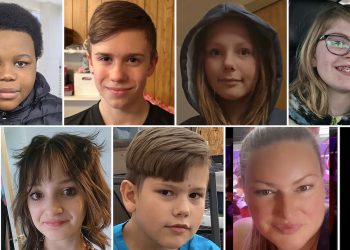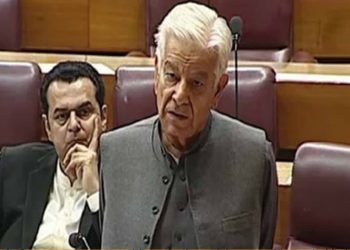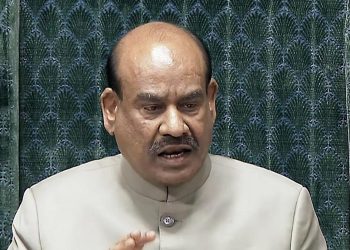Omaha Beach: Standing on the windswept beaches and bluffs of Normandy, a dwindling number of ageing veterans of history’s greatest air and sea invasion received the thanks and praise of a world transformed by their sacrifice. The mission now, they said, was to honour the dead and keep their memory alive, 75 years after the D-Day operation that portended the end of World War II.

“We know we don’t have much time left, so I tell my story so people know it was because of that generation, because of those guys in this cemetery,” said 99-year-old Steve Melnikoff of Maryland, standing at Colleville-Sur-Mer, where thousands of Americans are buried.
“All these generals with all this brass that don’t mean nothing,” he said. “These guys in the cemetery, they are the heroes.” Thursday’s anniversary was marked with eloquent speeches, profound silences and passionate pleas for an end to bloodshed.
French president Emmanuel Macron and US president Donald Trump praised the soldiers, sailors and airmen who took part in the invasion, codenamed Operation Overlord, saying it was the turning point that ended Nazi tyranny and ensured peace for Europe.
“You are the pride of our nation, you are the glory of our republic, and we thank you from the bottom of our heart,” Trump said of the warriors who took part in what he called the ultimate fight of good against evil in World War II.
“They battled not for control and domination, but for liberty, democracy and self-rule,” Trump said in a speech at the Normandy American Cemetery overlooking Omaha Beach, the bloodiest of five landing beaches.
Macron saluted the courage, generosity and strength of spirit that made them press on “to help men and women they didn’t know, to liberate a land most hadn’t seen before, for no other cause but freedom, democracy.”
He expressed France’s debt to the United States for freeing his country from the Nazis. Macron awarded five American veterans with the Chevalier of Legion of Honour, France’s highest award.
“We know what we owe to you, veterans, our freedom,” he said, switching from French to English. “On behalf of my nation I just want to say ‘thank you.’”
About 1,60,000 troops took part in D-Day, and many more fought in the ensuing Battle of Normandy. Of those 73,000 were from the United States, while 83,000 were from Britain and Canada. Troops started landing overnight from the air, then were joined by a massive force by sea on the beaches of Omaha, Utah, Juno, Sword and Gold, carried by 7,000 boats.
“The eyes of the world are upon you. The hopes and prayers of liberty-loving people everywhere march with you,” Gen Dwight D Eisenhower had said in his order of the day. “The tide has turned! The free men of the world are marching together to victory.”
On Wednesday, a commemoration was held in Portsmouth, England, the main embarkation point for the transport boats. Then the dignitaries came to the bluffs and beaches of Normandy, where veterans recalled what they saw 75 years ago.
“The water was full of dead men, the beach had burning landing craft,” said Jim Radford, 90, a British D-Day veteran from Hull, describing the scene near Gold Beach, where British landed. He was there again to watch the unveiling of a statue at Gold Beach, where a memorial to British fighters is to be erected.
At dawn on Thursday, hundreds of civilians and military alike from around the world gathered on Omaha Beach. Dick Jansen, 60, from the Netherlands, drank Canadian whisky from an enamel cup on the water’s edge.
Others scattered carnations into the waves. Randall Atanay, the son of a medic who tended to the dying and wounded, waded barefoot into the water, bonding with his dad, who has since died. Up to 12,000 people attended the ceremony at the Normandy American Cemetery, with US veterans, their numbers fast diminishing as years pass, the guests of honour.

A 21-gun salute thundered into the waters below the cemetery, on a bluff overlooking Omaha Beach, and across the rows of white crosses and Stars of David. The final resting places of more than 9,380 of the fallen stretched out before the guests.
Britain’s Prince Charles, his wife, Camilla, and Prime Minister Theresa May attended a remembrance service at the medieval cathedral in Bayeux, the first Normandy town liberated by Allied troops after D-Day.
Hundreds of people packed the seaside square in the town of Arromanches to applaud veterans of the Battle of Normandy that ensued. A wreath was placed outside the town’s D-Day Museum.
Gratitude was a powerful common theme.
Macron thanked soldiers “so that France could become free again” at the Gold Beach ceremony with May and uniformed veterans laid the cornerstone of the memorial that will record the names of thousands of troops under British command who died in Normandy.
“If one day can be said to have determined the fate of generations to come, in France, in Britain, in Europe and the world, that day was the 6th of June, 1944,” May said. As the sun rose that morning, not one of the thousands of men arriving in Normandy “knew whether they would still be alive when the sun set once again,” she said.
Passing on memories is especially urgent, with hundreds of World War II veterans now dying every day. Canadian prime minister Justin Trudeau hailed those who “took a gamble the world had never seen before.”
Speaking at Juno Beach where 14,000 Canadians came ashore, Trudeau lauded the resulting world order including the United Nations and NATO that have helped preserve peace. But postwar tensions were evident. Not invited to the remembrance was Russian president Vladimir Putin, who had been present for the 70th commemoration of D-Day.
On Wednesday, German chancellor Angela Merkel said it was a “gift of history” that she was able to participate in the ceremony on Britain’s southern coast. Some 22,000 German soldiers are among those buried around Normandy.
The D-Day invasion was a defining moment of military strategy complicated by unpredictable weather and human chaos in which soldiers from the US, Britain, Canada and other Allied nations applied relentless bravery to carve out a beachhead on ground that Nazi Germany had occupied for four years.
The Battle of Normandy hastened Germany’s defeat less than a year later. Still, that single day cost the lives of 4,414 Allied troops, 2,501 of them Americans. More than 5,000 were injured. On the German side, several thousand were killed or wounded.
From there, Allied troops would advance, take Paris in late summer and race with the Soviet Red Army to control as much German territory as possible by the time Adolf Hitler died in his Berlin bunker and Germany surrendered in May 1945.
The Soviet Union also fought valiantly against the Nazis — and lost more people than any other nation in World War II — but those final battles would divide Europe for decades between the West and the Soviet-controlled East, the face-off line of the Cold War.
“War is the most idiotic thing that man ever created,” said Charles Levesque, 93, who served in the Pacific theater. “Our enemies now are our friends, and our friends are our enemies. It doesn’t make any sense.”








Discussion about this post